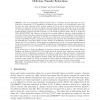15 search results - page 1 / 3 » Lower Bounds for Oblivious Transfer Reductions |
EUROCRYPT
1999
Springer
13 years 9 months ago
1999
Springer
We prove the first general and non-trivial lower bound for the number of times a 1-out-of-n Oblivious Transfer of strings of length should be invoked so as to obtain, by an inform...
CRYPTO
2005
Springer
13 years 10 months ago
2005
Springer
Since bit and string oblivious transfer and commitment, two primitives of paramount importance in secure two- and multi-party computation, cannot be realized in an unconditionally ...
CRYPTO
2010
Springer
13 years 6 months ago
2010
Springer
Due to its universality oblivious transfer (OT) is a primitive of great importance in secure multi-party computation. OT is impossible to implement from scratch in an unconditional...
FSTTCS
2010
Springer
13 years 2 months ago
2010
Springer
Oblivious transfer is a fundamental primitive in cryptography. While perfect information theoretic security is impossible, quantum oblivious transfer protocols can limit the disho...
EUROCRYPT
1999
Springer
13 years 9 months ago
1999
Springer
We consider the problem of basing Oblivious Transfer (OT) and Bit Commitment (BC), with information theoretic security, on seemingly weaker primitives. We introduce a general model...



